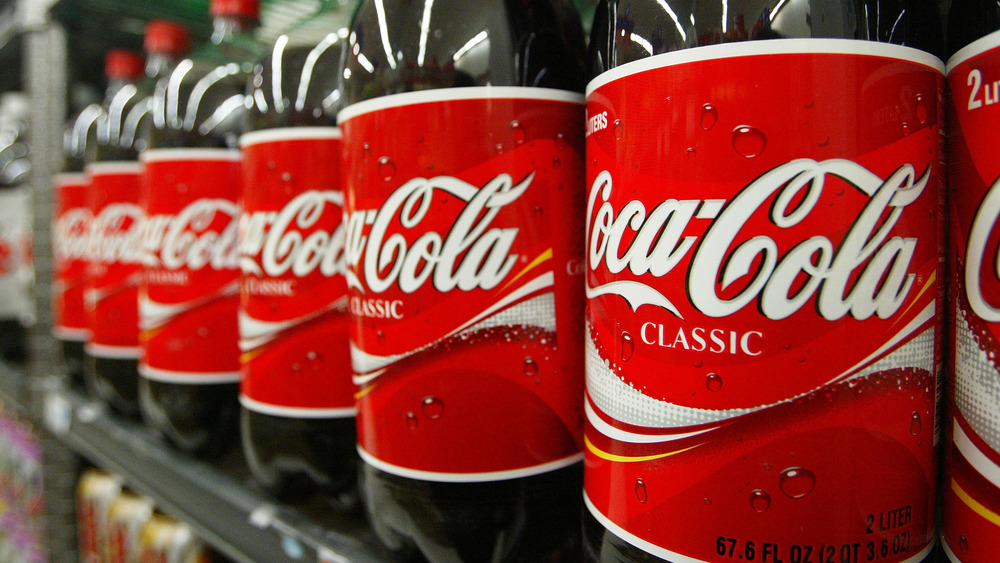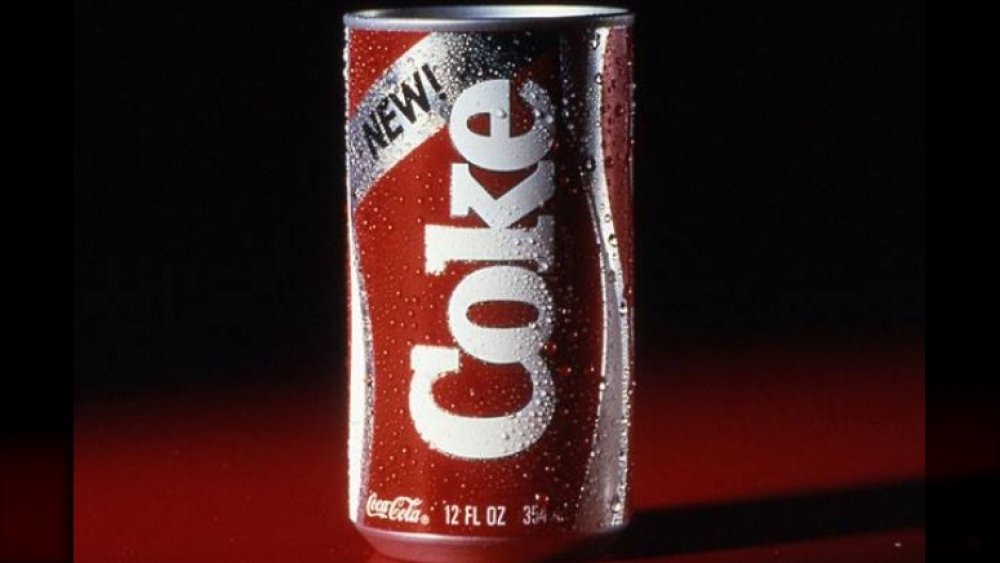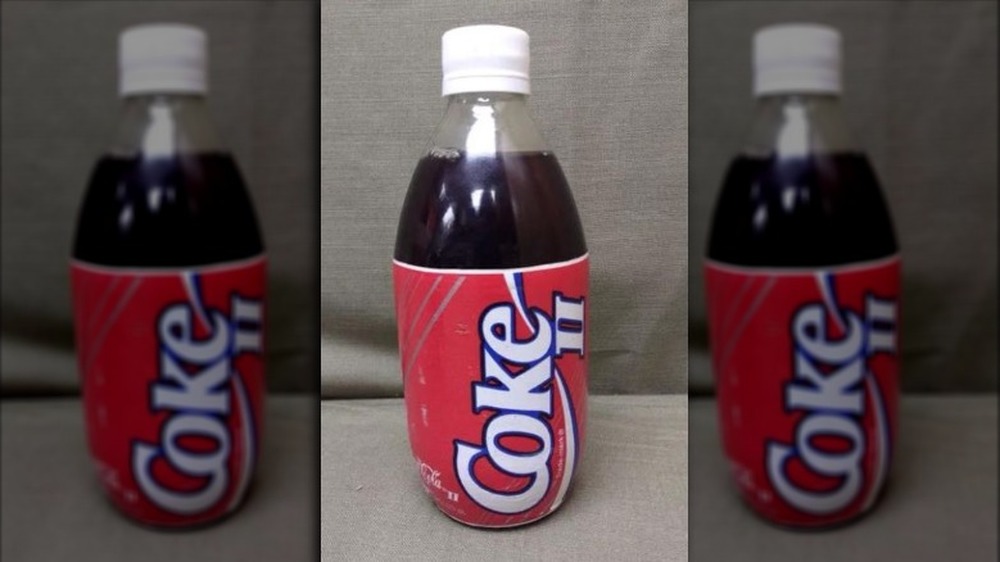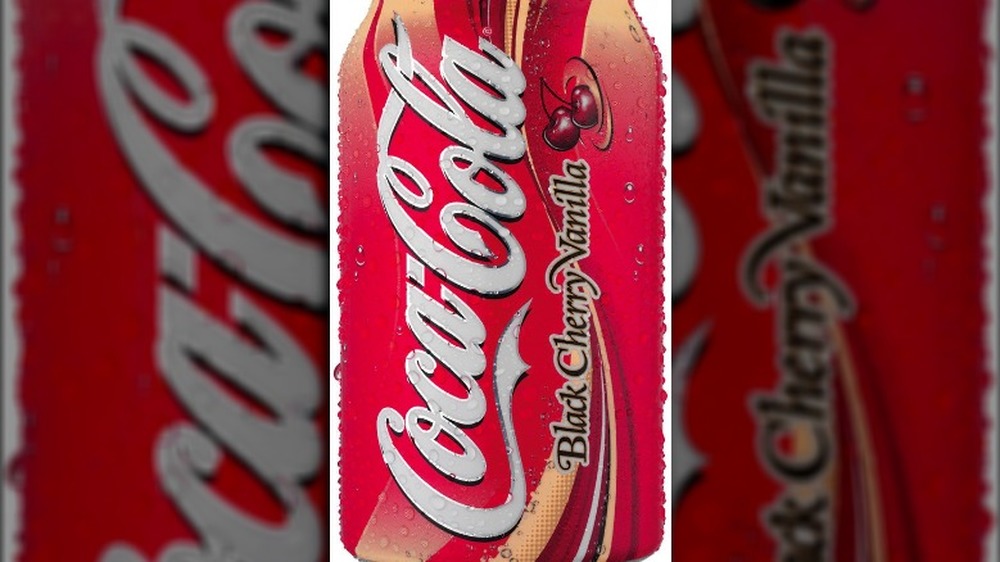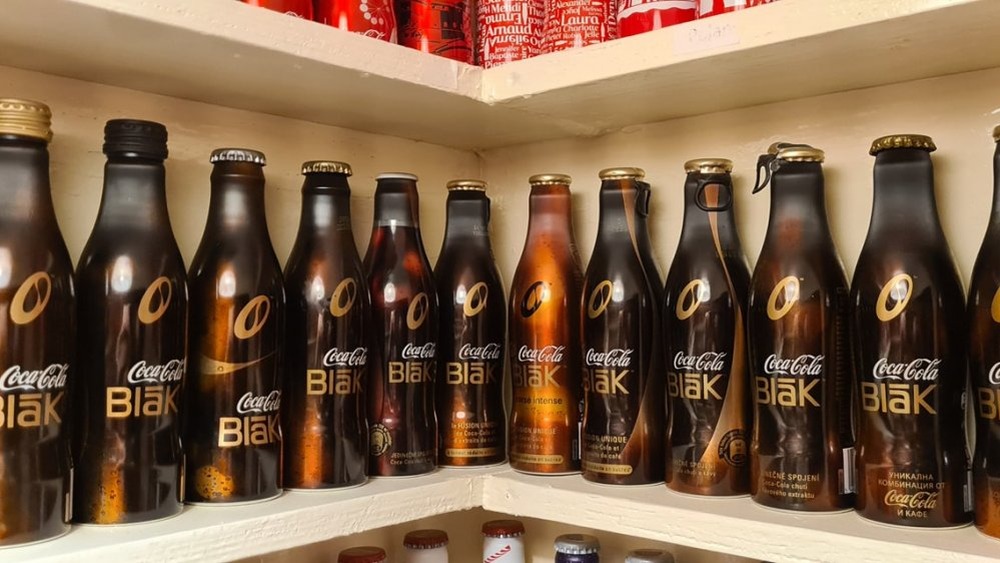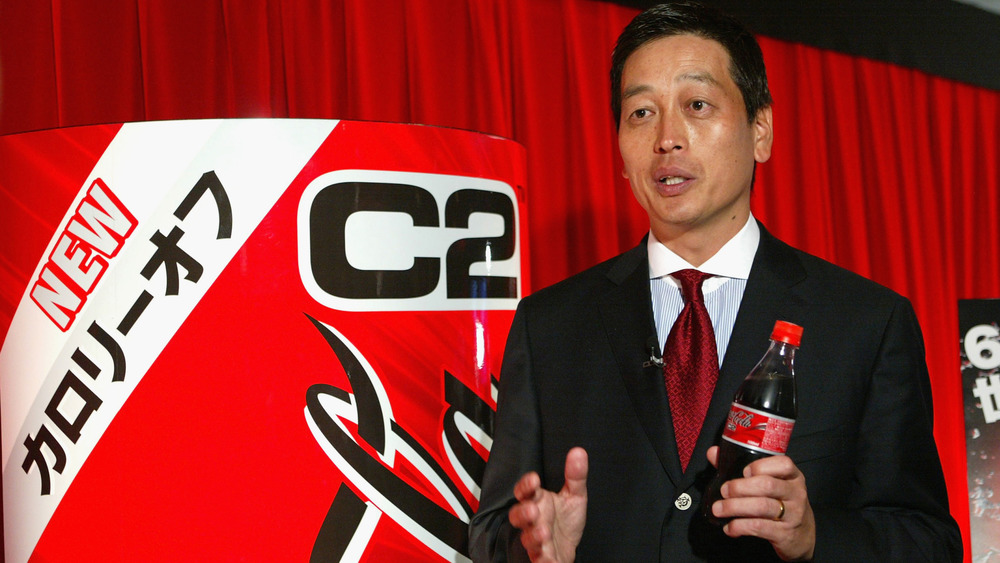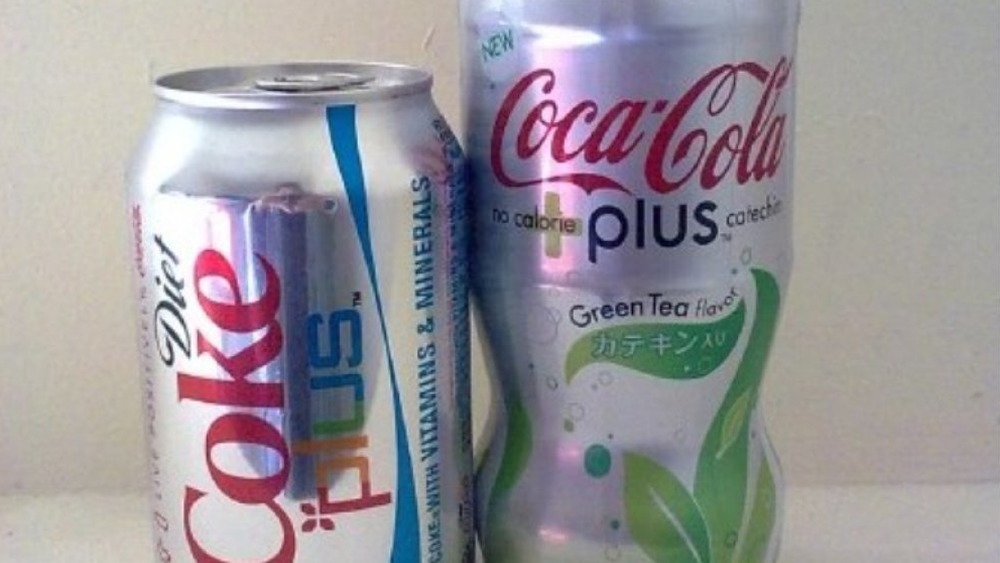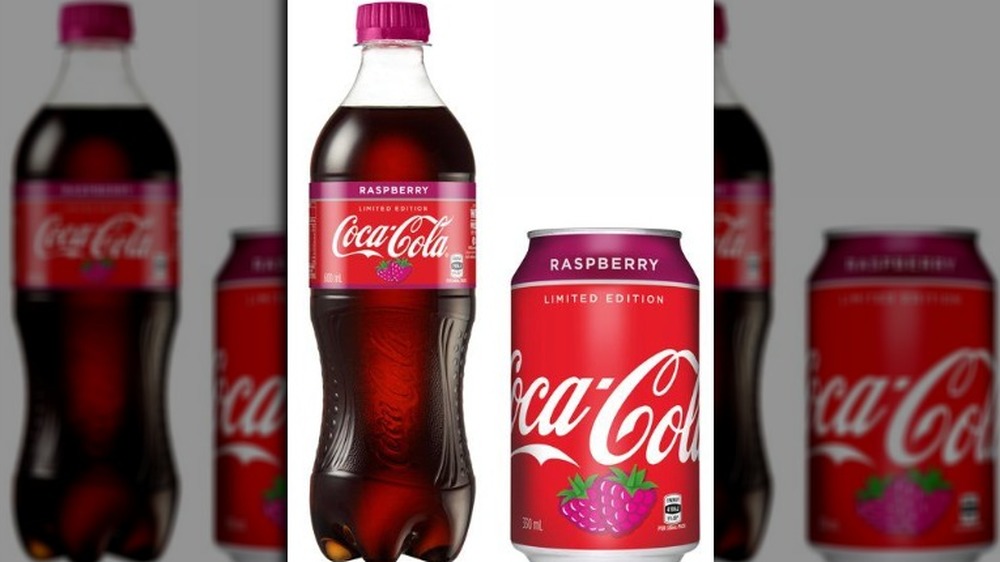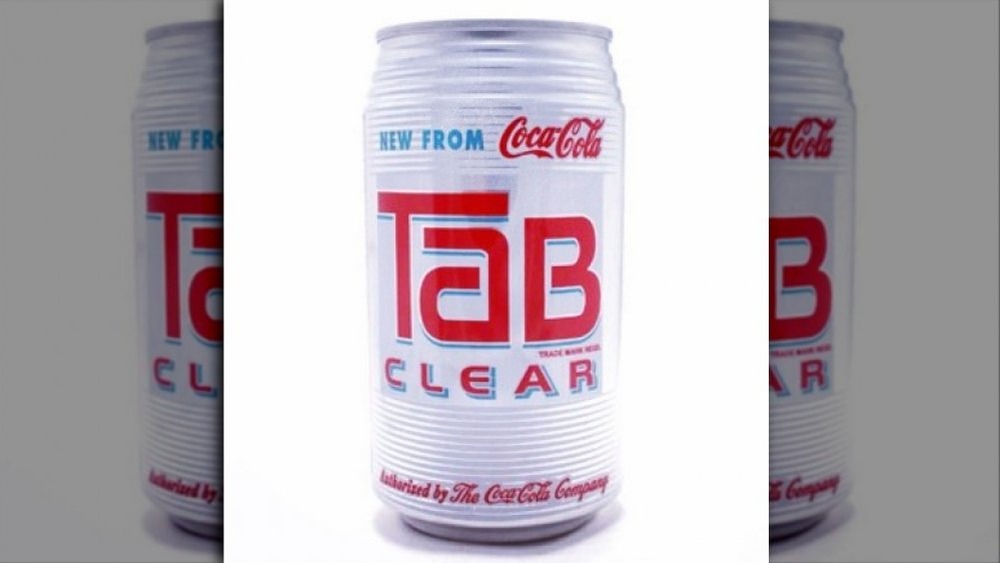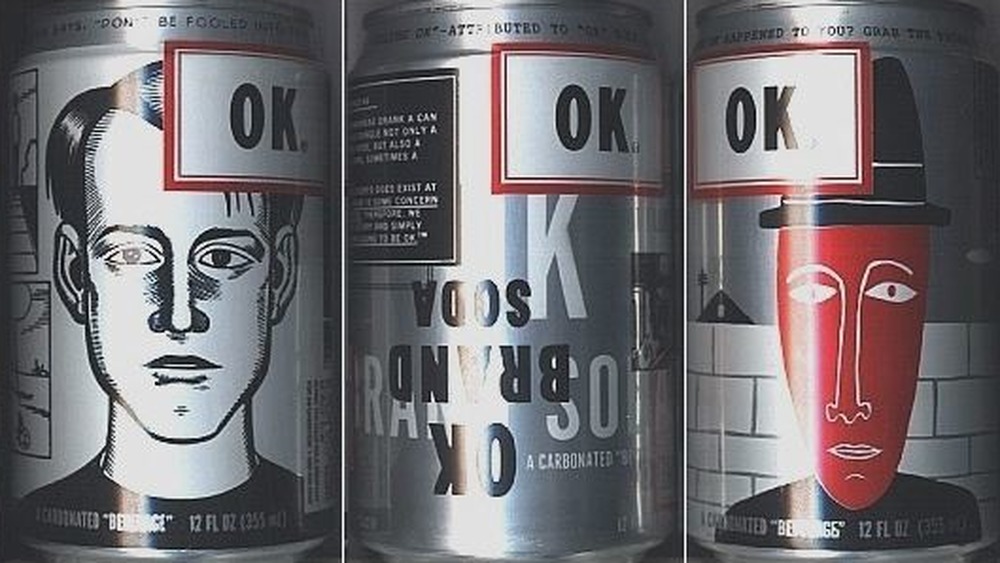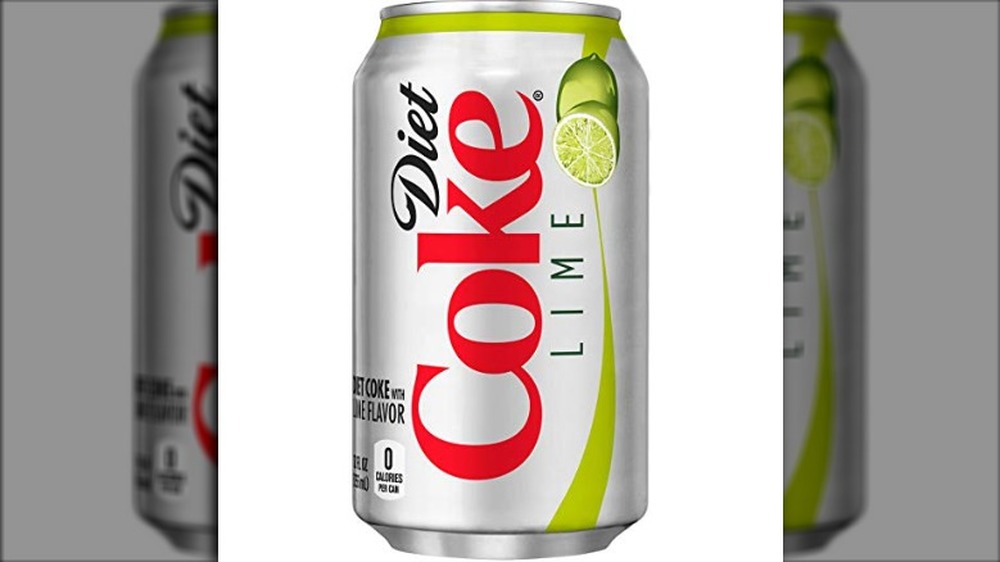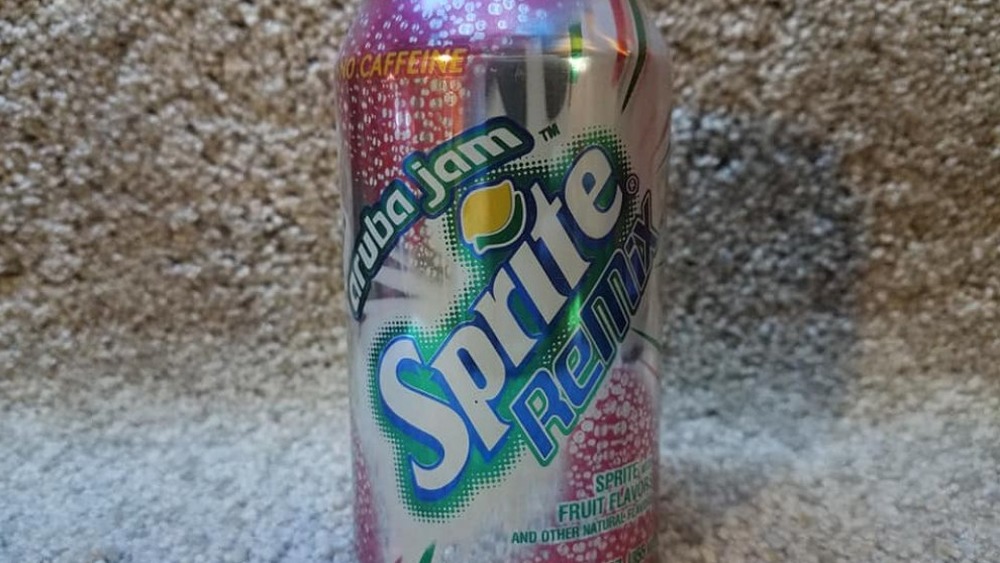Discontinued Coke Drinks That Need To Make A Comeback
It's a big, wild soft drink world out there. Everyone and their cousin is looking for the next Coca-Cola, and Coke itself has been experimenting just as much as the next soda giant — if not more. Sometimes these experiments lead to a hero brand like Diet Coke. Other times, the end result is somewhat less successful. As you'd assume, the latter scenario is way more common. Over time, the unsuccessful drinks might just pile up to a point where the company decides that enough is enough, and discontinues 200 brands that aren't really cutting it — as it did in October 2020 (via Business Insider). In other words, very few carbonated drinks, if any, are permanently safe.
However, that's not to say that a discontinued drink is always a bad one. The soda itself could be just fine, or even excellent. However, complex circumstances, poor sales, marketing whims, or just not quite hitting the spot at a particular time and place may spell doom for an otherwise perfectly delicious drink brand. Today, it's time to revisit some of the Coca-Cola Company's many excellent drinks that you can't get anymore, but arguably should. Let's take a look at discontinued Coke drinks that need to make a comeback.
New Coke was way better than its reputation implies
When you think of the words "Coca-Cola" and "failure" together, chances are that New Coke is the first thing that springs to mind. A 1985 ill-fated attempt to swap the classic soft drink's recipe and rebrand it as New Coke led to a national outrage, and at one point, furious cola consumers bombarded the soda company with 8,000 phone calls a day. In the end, Coca-Cola was forced to bring back the old recipe after just three months. New Coke became one of the most infamous marketing flops around, and if you've tasted it at all, it was probably because of the drink's short-lived comeback as a Stranger Things -inspired promotion in 2019.
However, as Mother Jones points out, the company didn't just randomly roll out the New Coke formula. They studied and tweaked it for years, and it actually tasted rather delicious — and was close enough to the original that some of its louder opponents reportedly couldn't taste the difference when they actually tried it. New Coke's bad rap and subsequent cancellation largely happened because of an extremely loud, complaining minority that opposed the very idea of a familiar thing changing in any way, and the media attention they received eventually snowballed into a national outrage.
In other words, there's a perfectly delicious Coca-Cola out there that you've never tasted (unless you splurged on the limited edition cans in 2019), just because Boomers thought change is bad. Not cool.
Coke II was the new New Coke
Oddly, New Coke wasn't the controversial recipe's only adventure in the annals of Cokedom, because it turns out the company was quite fond of their most famous failure (via Mental Floss). Enter Coke II.
Coke II was, of course, just New Coke, only without all the marketing frenzy and, the company possibly hoped, the negative connotations. They test-marketed the drink on the relative down low, and in 1992, Coke II joined the official Coca-Cola roster. The brand may have failed to attract hundreds of thousands of complaints like its "predecessor," but the public was still formally all out of interest for any and all new versions of their favorite drink, thank you very much. As such, the sales of Coke II slowly whittled down, and the drink was finally discontinued in 2002.
Incidentally, Coca-Cola has never really admitted why they loved this particular recipe so much that they were willing to bet on a losing horse twice. However, their competitors at Pepsi reportedly analyzed the formula once, and figured out that the new version of Coke was way cheaper to make, and would have saved the Coca-Cola Company an estimated $50 million a year in ingredients. So, you'd imagine they'd be down for a third round, right? Come on, Coke. Don't fear the history — let the public form its own opinions.
Coke Black Cherry Vanilla is worth a revisit
Coca-Cola Black Cherry Vanilla seems like a perfect storm of dessert flavors, to the point that it's actually pretty surprising the flavor isn't available anymore. As an even bigger surprise, according to Insider the drink only lasted a year before disappearing from the market.
Black Cherry Vanilla Coke debuted in January 2006 as both regular and Diet version (via BevNet), while Coca-Cola Vanilla and Diet Coke Vanilla went on hiatus. Unfortunately, the new, cherried-up flavor didn't last, and Black Cherry Vanilla disappeared from the market in 2007. Since CSP notes that Coca-Cola brought the regular Vanilla Coke back in the same year — along with the new Vanilla Coke Zero — it may be that the company wanted to simply stack their chips on one vanilla-themed soda treat.
While it's hard to blame the company for focusing on the admittedly delicious Vanilla Coke, one can't help but feel that the extra oomph of black cherry flavor would elevate the drink to a completely different level. Fortunately, Coke seems to be slowly reaching the same conclusion, too. After all, they now have an almost-but-not-quite version of the flavor combination available — the new Cherry Vanilla Coke.
Coca-Cola Blak was ahead of the curve
Cold, sweet coffee drinks are everywhere these days. Thanks to the fusions of cold and coffee like the Starbucks frappuccino, no one's batting an eyelid if you order a McDonald's frappe, or even something with "unicorn" in the name. Now, imagine if Coke, arguably the premiere drink in the cold, sweet game, had a coffee concoction in its repertoire. License to print money, right?
Not necessarily. Back in the ancient days of 2006, Coke introduced Coca-Cola Blak — or BlāK, if you will — to cater to the coffee-hungry crowd with a sweet tooth and an affinity for low-temperature drinks. The experiment lasted 17 months.
Per CNN Business, however, Coca-Cola doesn't consider Blak an utter failure, but simply an unfortunate victim of bad timing. "That was a trend before its time," Coca-Cola's chief technical officer Nancy Quan has stated. "I don't think people were ready to have a coffee portfolio within the Coca-Cola brand."
Product identity issues may have doomed the Coke-coffee mashup the first time around, but there's actually a chance that you'll see some variation of Blak on the shelves one day. Coke has recognized the public's evolving, coffee-hungry palates, and has been slowly, steadily experimenting with similar products, such as Coca-Cola Plus Coffee. Maybe one day, the company will deem the world ready to Blak proper — with or without the wacky spelling.
Coca-Cola C2 might work better in today's world
Coca-Cola C2 was definitely among the Coke products that were massive fails. According to Harvard Business Review, C2 was supposed to be the company's Next Big Thing after Diet Coke itself. Unfortunately, its grand selling point was ... to offer half the carbs and calories of Diet Coke, in order to reach the lucrative audience of men aged 20-40 who rejected Diet Coke's "feminine" image.
When you look beyond the "oof" factor of that elevator pitch — as well as the fact that the company blew $50 million to launch C2 in 2004 — there were a few problems with the product. As a hybrid drink, C2 wasn't quite here or there, so its sales mostly cut into those of Coke and Diet Coke. As a result, C2 eventually skulked away, and the considerably more successful Coke Zero took the spotlight.
So, why bring C2 back at all? Because every little bit helps, that's why. Many people could do with eating a little bit healthier these days, but people being people, it's always great if the healthier thing can still be a burger — say, a Beyond Burger. For people who are interested in cutting back their drink calorie intake, but not interested enough to switch to water (or, for that matter, Coke Zero) entirely, C2 might act as a comfortable middle ground — think half-and-half, if you will.
A proper version of Diet Coke Plus would be most welcome
The marketing concept behind Diet Coke Plus was an interesting one. Per Reuters, the company introduced the drink in 2007, and it was advertised as "a good source of vitamins B3, B6, and B12, and the minerals zinc and magnesium." The imagery about added minerals and vitamins was pretty neat — after all, Coke is hardly the healthiest option in any given scenario, but that way, you at least get some good out of that sugar rush.
Unfortunately, Marketing Week notes that reality wasn't quite as sunny as the concept. By 2008, Coke found itself at odds with the FDA. The agency felt that it wasn't "appropriate to fortify snack foods such as carbonated beverages," and stated that Diet Coke Plus didn't actually include enough extra nutrients to warrant the whole "Plus" thing. Coca-Cola tried to defend the product, but poor sales eventually drove the product's existence from, well, plus to zero.
While Diet Coke Plus is a non-entity today, imagine the drink making a triumphant return in these health-conscious times — only this time with enough beneficial vitamins and minerals to satisfy the FDA when they inevitably come calling. Sure, it's a tall order, especially since the FDA expressed its distaste about the whole concept. Still, if Coca-Cola one day manages to clear that hurdle, Diet Coke Plus might turn out to be a winner.
Coca-Cola Raspberry is a beloved New Zealand treat
Coca-Cola Raspberry seems to be a welcome presence whenever it appears — at least, if you ask the good people of New Zealand. Per the New Zealand Herald, the raspberry-flavored cola drink debuted in 2006, and after a temporary visit in the land of lost beverages, the company announced the drink's return as a summer treat for the Kiwi country in 2017.
Coca-Cola chose the flavor after finding out to its mild surprise how much the locals loved the drink. "When we launched Coca-Cola No Sugar a few months ago, when we were teasing the campaign that we had a new product coming, a lot of the response was saying 'Oh are you launching Coke Raspberry', so we realised it was something that Kiwis had an affinity with," Karen Thompson, head of communications for Coca-Cola Oceania, commented. "We realised that it was something iconic among New Zealanders so we said; 'Well, why don't we?'."
A drink so tasty that an entire country waxes nostalgic over it sounds interesting, doesn't it? Fortunately, Coca-Cola has kept Coke Raspberry's nostalgia factor in mind, and has been experimenting with a slightly fancier, California Raspberry-flavored spin on the theme as part of their Local Flavors product line since 2018 (via Today). Since the berry remains such an active part of Coke's recipe game, perhaps a refreshing can of that New Zealand-style Raspberry Coke isn't completely out of the question somewhere down the line.
Tab Clear was designed to fail
Tab Clear, as Mental Floss tells us, was a so-called kamikaze product — a drink designed to fall, and to take a competitor down with it. In the early 1990s, drink manufacturers were riding high on the strange trend of transparent cola drinks, and Crystal Pepsi was sitting pretty on top of the pile. Coke needed to do something to tear it down, but preferably in a way that wouldn't tarnish their own main product's reputation.
To achieve this, Coca-Cola turned to their ailing, "calorie-conscious" diet drink brand Tab, and rolled the transparent Tab Clear out as a response to Crystal Pepsi in 1993. As Pepsi spent big bucks in an effort to establish their drink as a mainstream thing, Coke just happily gave the impression that Tab Clear was a diet drink. Because it was an obvious competitor to Crystal Pepsi, the consumers felt that had to be a vaguely medicinal drink, as well. Just like that, Crystal Pepsi went from a solid up-and-comer to a product with no clear identity. After that, neither it nor Tab Clear lasted for long.
Tab Clear might have been a failure by design, but the drink itself is hardly at fault for Coca-Cola Company's strategic shenanigans. Sites like Do You Remember? still express nostalgia for Tab Clear's taste, which one user describes as "lovely" and "marginally cinnamon-like." Besides, Coke just discontinued regular Tab this October — what better replacement than its clear cousin that never got its rightful chance?
OK Soda is already a cult favorite
The story of OK Soda ranks among the stranger ones in the annals of soft drink history. Per Fast Company, the citrus-tanged OK Soda got its start when Coca-Cola Chief of Marketing Sergio Zyman — the guy behind the New Coke debacle — noticed that "Coca-Cola" was second only to "OK" on the list of best-known words in the world. According to Business Insider, the drink was launched with a strange, highly subversive product design and an anti-marketing campaign that refused to even tell what OK Soda tasted like, apart from the fact that it was "a carbonated beverage."
In the end, consumers weren't ready for a refreshing drink that was basically sold as "postmodernism: the potable." After a limited release, the experiment that was OK Soda was discontinued in 1995. However, the product reportedly has a bit of a cult following, so who knows? Maybe a second time around would be the charm for this curiously disenfranchised drink.
Diet Coke Lime seems like an obvious winner
If you feel uncertain why Coca-Cola should bring Diet Coke Lime back, just say the name out loud. Diet. Coke. Lime. Diet Coke is delicious by default. A slice of lime's pairs nicely in an ice-cold glass of it. How could that combination not work?
Unfortunately, the market can be a cruel mistress. As Venessa Wong of Buzzfeed News reported at the time of the flavor's discontinuation, Diet Coke Lime debuted in early 2018 as a limited-time flavor, but fell victim to the diet soda sales rut a few short months later.
Tragic as this may be, there's no keeping an awesome taste combination down. Diet Coke Lime may be a goner (at least for now), but things might not be that way forever. In early 2020, Coca-Cola started experimenting in the U.K. with a new Diet Coke flavor called "Sublime Lime," and according to Ally Head of Marie Claire, many who have tried it have been as impressed as the people who discovered that Diet Coke Lime were disappointed back in the day. Hopefully, this positive feedback means that the blessed union of lime and Diet Coke will eventually grace Stateside grocery store shelves once more.
The missing flavors of Sprite Remix need to return
Sprite Remix was a delightfully fruity variant of Coca-Cola's famous lemon-and-lime soda. The brand debuted in 2002 in the U.S. and Canada, but the trio of the tropical Remix flavors — Tropical, Berryclear, and Aruba Jam — failed to capture the hearts of the public during their lifespan. As a result, the line died a pauper's death in 2005, because the sales simply weren't good enough.
According to Business Insider, Sprite Remix's lack of popularity was the reason for its initial cancellation, so imagine everyone's surprise when Coke randomly decided to unleash the Tropical variant upon the unwary world in 2016. In a statement about the drink's resurrection Coke's Sparkling Brands vice president Kimberly Paige revealed that the flavor had been the subject of active fan interest for quite some time. "Fans have thirsted for the return of this popular Sprite tropical flavor for years," Paige said, "And it's great to finally bring it back to reward their enthusiasm."
That's all fine and well for fans of Sprite Remix Tropical, which is now sold as Sprite Tropical Mix. But what about Aruba Jam and Berryclear? Surely, they deserve another run as well.
